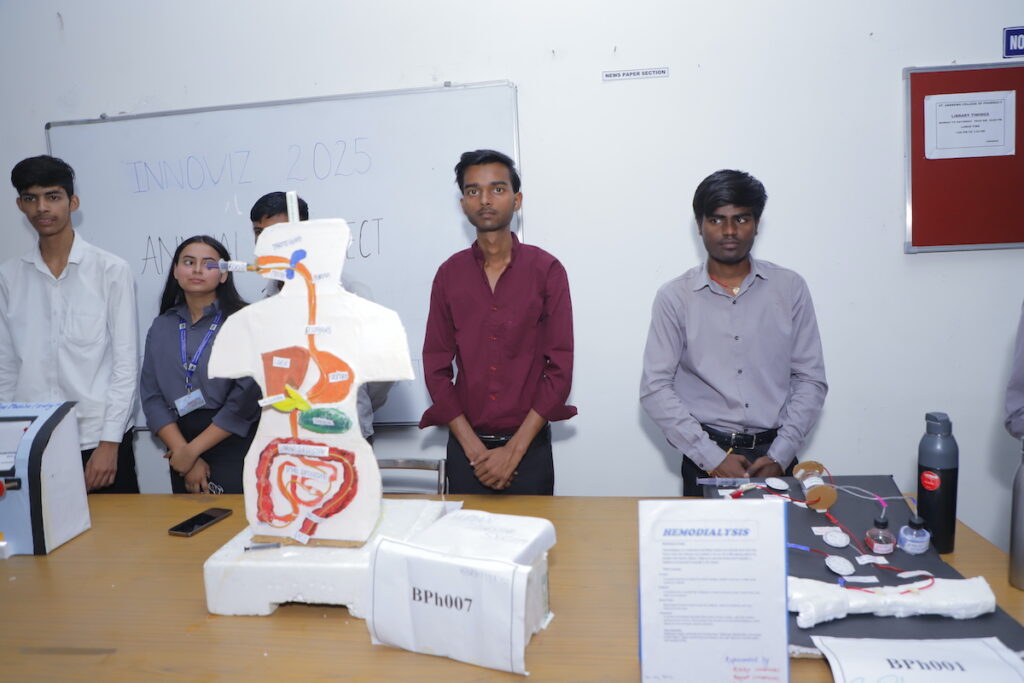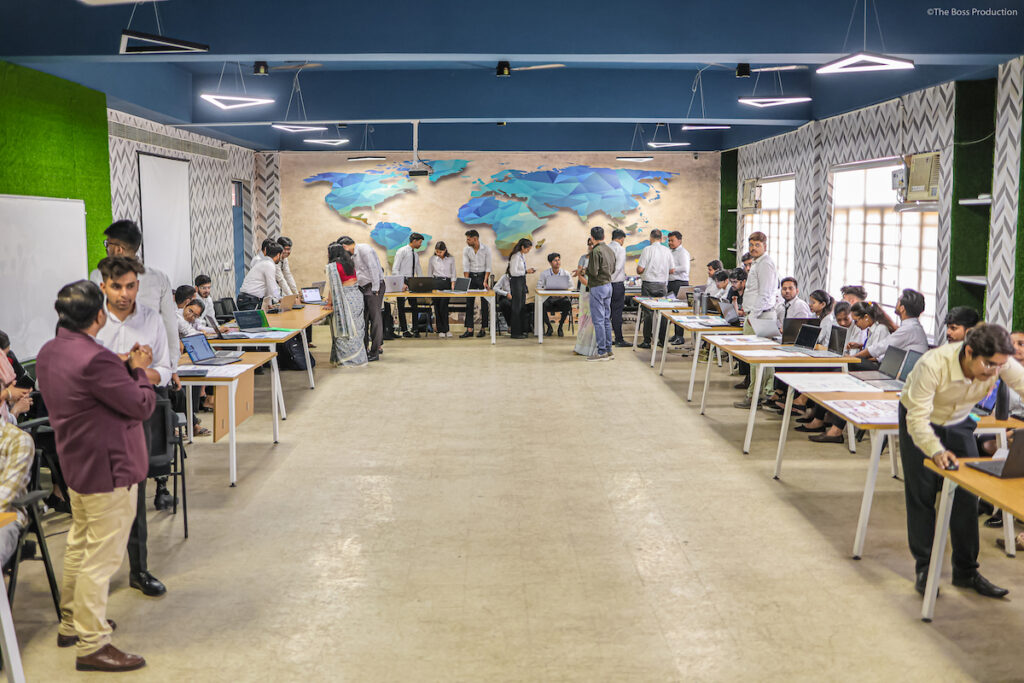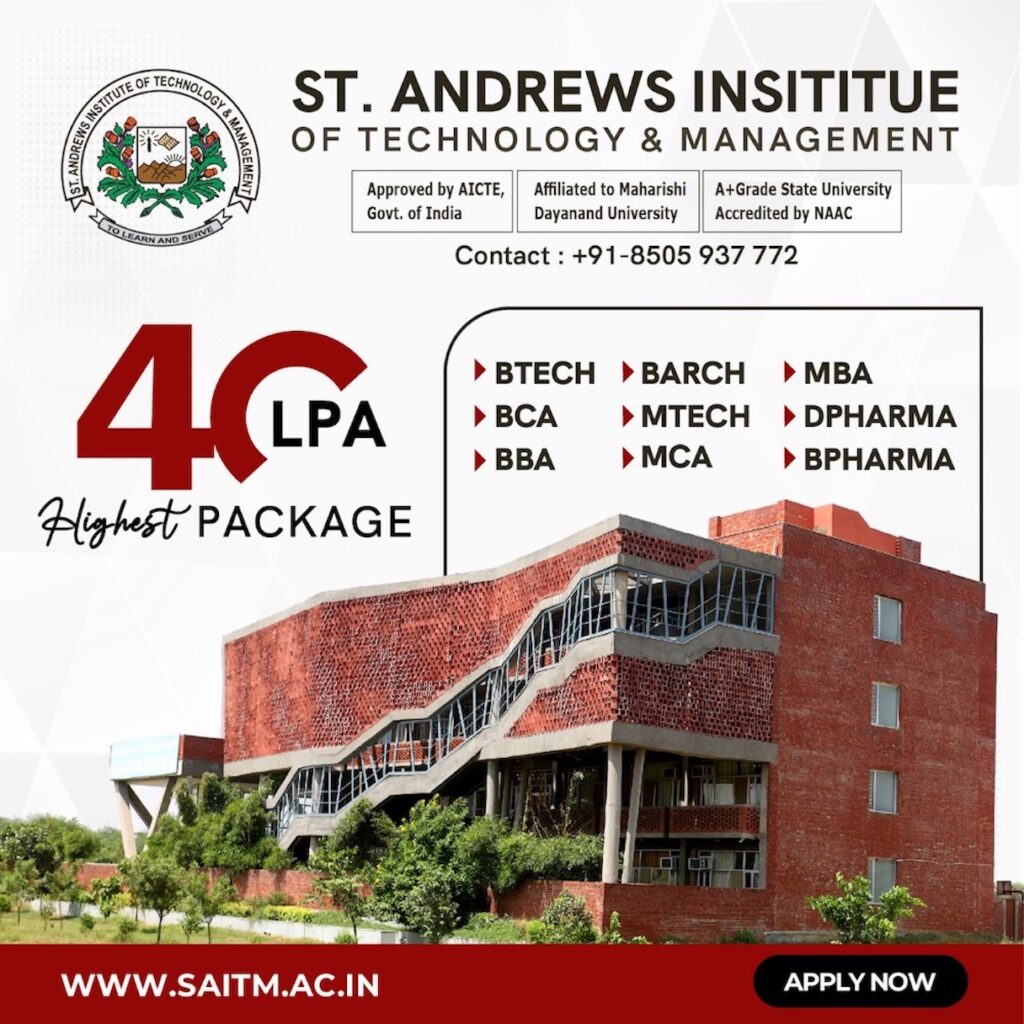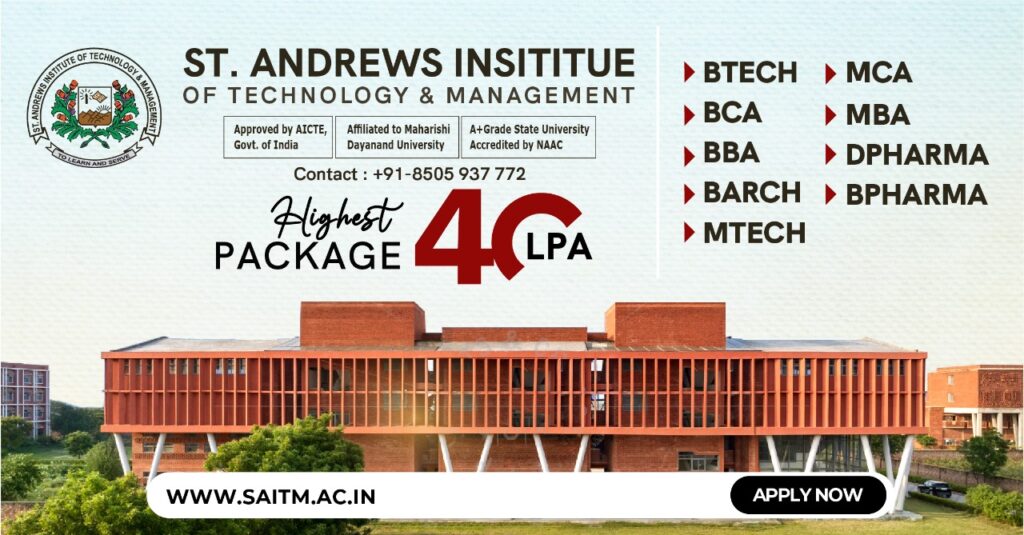1 Year Diploma in Pharmacy
A 1-year Diploma in Pharmacy is an accelerated program designed to provide foundational knowledge and practical skills in the field of pharmacy. This course is ideal for students seeking a quick entry into the pharmaceutical industry, offering education on drug formulations, dispensing, and healthcare management.
It covers essential topics like pharmacology, pharmacognosy, and pharmaceutical chemistry, preparing students for roles such as pharmacy assistants or technicians.
Although shorter than the traditional 2-year D Pharmacy course, this course can open doors to entry-level positions in hospitals, retail pharmacies, and healthcare organizations.
Some of the most opted courses in India and St. Andrews college or different Engineering college or Management colleges are as follows:-
- Btech
- Btech CSE
- BCA
- Btech ETCE
- MTech
- BBA
- MBA
- MCA
- DPharma – St. Andrews College of Pharmacy
- BPharma – St. Andrews College of Pharmacy
- BArch – St. Andrews College of Architecture
Overview of the 1 Year Diploma in Pharmacy

A 1-year Diploma in Pharmacy (D.Pharma) is a shorter version of the standard 2-year program, designed to impart basic knowledge and skills in pharmacy to students.
Here’s a quick overview of what such a program typically includes:
Program Length: As the name suggests, this course spans one year, focusing on essential aspects of pharmacy.
Curriculum: The curriculum generally covers basic pharmacology, pharmacotherapeutics, and pharmacy law and ethics. It includes subjects like pharmaceutical chemistry, biochemistry, human anatomy and physiology, drug store and business management, and health education.
Eligibility: Candidates usually need to have completed their higher secondary education (10+2) with a focus on science subjects, particularly chemistry and biology.
Skills Developed: The course aims to develop foundational skills in pharmacy operations, understanding of medications, patient communication, and basic management of medical inventories.
Career Opportunities: Graduates can work as pharmacy technicians, assistants in hospital pharmacies, retail pharmacies, or continue their education in the field. It’s important to note that the scope of practice for diploma holders might be limited compared to those with a full-fledged pharmacy degree, and regulations can vary by region.
Certification and Further Studies: After completing the diploma, students might need to pass certain certification exams to practice, depending on local regulations. They can also choose to pursue further studies, such as a Bachelor of Pharmacy (B.Pharm), to deepen their knowledge and expand their career opportunities.
Top Colleges Offering 1 Year Diploma in Pharmacy

The availability of a 1-year Diploma in Pharmacy (D.Pharma) is quite rare as the standard duration for a D Pharma course is typically 2 years. However, some institutions may offer accelerated versions or certificate courses that can be completed in a shorter duration.
For those specifically looking for 1-year programs or the standard 2-year programs, here are some top colleges known for their pharmacy courses, primarily in India:
Jamia Hamdard, New Delhi – Known for its strong pharmacy programs, although it primarily offers the standard 2-year D.Pharma course.
St. Andrews College of Pharmacy (SACP), Delhi NCR – Located in Delhi NCR, SACP offers a D. Pharma program that emphasizes practical skills and industry readiness. The college is known for its modern facilities and curriculum aligned with the latest industry trends.
JSS College of Pharmacy, Ooty & Mysore – Well-regarded for its pharmacy education, offering a variety of pharmacy-related courses.
Poona College of Pharmacy, Pune – Part of Bharati Vidyapeeth University, known for its strong focus on pharmaceutical sciences.
Amrita School of Pharmacy, Kochi – Offers a robust D.Pharma program, with a focus on practical and theoretical knowledge.
Eligibility Criteria and Admission Process

The eligibility criteria and admission process for a Diploma in Pharmacy (D.Pharma) program generally follow a standard set of requirements, although specifics can vary by institution and geographic location.
Here’s an overview of the typical criteria and admission steps:
Eligibility Criteria
Educational Qualification: Applicants must have completed their higher secondary education (10+2) from a recognized board.
Subjects: Candidates should have studied Physics, Chemistry, and Biology or Mathematics as compulsory subjects.
Minimum Marks: Most colleges require a minimum percentage in the 10+2 exams, usually around 50% for general candidates and a lower threshold for reserved categories.
Age Limit: Some institutions might have a minimum age requirement, often 17 years at the time of admission.
Admission Process
Entrance Exams: Many colleges admit students based on performance in state-level or national-level pharmacy entrance exams. Common entrance tests include the Pharmacy Entrance Test (PET), state-specific CETs, and others like NEET for some pharmacy courses.
Application: Candidates need to fill out an application form, which can be available online on the respective college’s website or through offline modes.
Documentation: Submitting necessary documents such as mark sheets, transfer certificates, ID proofs, and photographs is part of the application process.
Merit List/Interviews: After clearing the entrance exam, candidates might be called for an interview or a counseling session. Some colleges also prepare a merit list based on the entrance exam scores and marks obtained in the 10+2 exams.
Counseling and Seat Allocation: Final admissions are often conducted through a counseling process where candidates select their preference of colleges and are allocated seats based on their entrance exam rank and availability.
Registration and Fees: Once admitted, students need to register for the course and pay the requisite fees to confirm their enrollment.
Specifics for Accelerated or Shorter Programs
Direct Admissions: For shorter or specialized programs, some institutions might offer direct admission based on 10+2 marks without the need for an entrance test.
Fast-Track Options: If offered, fast-track programs may have slightly different criteria, focusing more on the intensity of the curriculum and the readiness of the student to handle an accelerated learning pace.
Syllabus and Curriculum Breakdown

The syllabus and curriculum for a standard Diploma in Pharmacy (D.Pharma) are structured to provide students with foundational knowledge and skills in pharmaceutical sciences.
While specific courses can vary between institutions, the following provides a general breakdown of the topics typically covered in a 2-year D.Pharma program, which can be adjusted for a 1-year accelerated format by condensing the content and increasing the intensity of the studies.
Year 1
1. Pharmaceutics I
- Introduction to different dosage forms
- Basics of pharmaceutical operations like weighing, mixing, granulation, drying, packaging, and labeling
2. Pharmaceutical Chemistry I
- Inorganic pharmaceuticals covering important compounds of pharmaceutical interest
- Study of compounds such as antacids, laxatives, antidotes, and others
3. Pharmacognosy
- Sources and applications of drugs from natural origin
- Study of fibers, gums, oils, and other products of natural origin
4. Biochemistry & Clinical Pathology
- Basic concepts in biochemistry
- Clinical pathology including blood tests and urine analysis for better understanding of clinical conditions
5. Human Anatomy & Physiology
- Detailed study of the human body with a focus on the physiological process and anatomy
6. Health Education & Community Pharmacy
- Concepts of health, nutrition, first aid, and environmental sanitation
- Important aspects of epidemiology and community health
Year 2
1. Pharmaceutics II
- Advanced concepts in pharmaceutical formulations and compounding
- Techniques for preparing sterile and non-sterile formulations
2. Pharmaceutical Chemistry II
- Organic pharmaceuticals including detailed study of drug classes, their mechanisms, and uses
- Introduction to basic medicinal chemistry
3. Pharmacology & Toxicology
- Introduction to pharmacological activities, therapeutic classes of drugs, and basic toxicology
4. Pharmaceutical Jurisprudence
- Study of the laws and regulations applicable to the practice of pharmacy in the country
5. Drug Store & Business Management
- Managing drug stores, inventory control, and soft skills needed for running a pharmacy business
6. Hospital & Clinical Pharmacy
- Roles and responsibilities of a pharmacist in a hospital setting
- Basics of clinical pharmacy and patient care
Practical Training
Most D.Pharma programs also include practical laboratory work aligned with the subjects to provide hands-on experience in compounding, drug analysis, and usage of various instruments.
Additionally, an internship or training period in a retail or hospital pharmacy is usually a part of the curriculum to provide real-world experience.
Scope of 1 Year Diploma in Pharmacy

The scope of a 1-year Diploma in Pharmacy (D.Pharma), though not as extensive as the standard 2-year program, can still offer significant opportunities in various sectors of the healthcare and pharmaceutical industries.
This shorter duration course is designed to provide a foundational education in pharmacy, focusing on the essential skills and knowledge needed for entry-level positions.
Here’s what the scope generally includes:
Career Opportunities
Pharmacy Technicians: Graduates can work as technicians in retail pharmacies, hospitals, and clinics, assisting pharmacists in preparing and dispensing medications.
Community Pharmacy: Working in community drug stores to manage inventory, advise customers on over-the-counter medications, and assist with other retail operations.
Hospital Pharmacy Assistants: Supporting hospital pharmacists in managing drug distributions to different departments within hospitals and ensuring proper storage and dispensation of medications.
Sales and Marketing: Entry-level positions in pharmaceutical manufacturing companies in the sales and marketing departments, promoting pharmaceutical products and liaising with healthcare professionals.
Educational Advancement
Further Studies: After completing a 1-year diploma, students may choose to pursue further education such as a full 2-year D.Pharma (if the 1-year course is considered equivalent to the first year of the standard program), or even a Bachelor of Pharmacy (B.Pharm) to deepen their knowledge and enhance their qualifications.
Certification Courses: Many graduates also opt for additional certifications in pharmacy-related fields, such as pharmacology, drug store management, or even specialized areas like geriatric care or compounding.
Licensing and Certification
Depending on the jurisdiction, graduates may need to obtain a license or certification to practice. This typically involves passing a specific examination that tests both theoretical knowledge and practical skills.
It’s important to note that in some regions, the scope of practice for those with a 1-year diploma might be more limited compared to those with a 2-year diploma or a degree in pharmacy. Regulations may restrict their roles to assisting fully licensed pharmacists rather than dispensing medication independently.
Limitations
The 1-year diploma may not be recognized for certain advanced or specialized roles in pharmacy that require a more comprehensive education and training.
Graduates may face limitations in career growth without further education or obtaining additional qualifications.
Career Opportunities After Completing 1 Year Diploma in Pharmacy

Completing a 1-year Diploma in Pharmacy can open up a range of entry-level opportunities in various sectors of the healthcare and pharmaceutical industries.
Although this shorter duration may limit the scope of practice compared to a full 2-year diploma or a degree in pharmacy, there are still several paths one can pursue:
Pharmacy Technician
Pharmacy technicians are vital in both retail and hospital settings. They assist pharmacists in dispensing medications, managing inventories, and handling customer or patient inquiries. Technicians need to have good organizational skills and a strong understanding of medication names, uses, and dosages.
Retail Pharmacy Assistant
Working in community drug stores or retail pharmacies, assistants help with the day-to-day operations, including stocking shelves, managing inventory, and sometimes assisting customers with general inquiries about over-the-counter products.
Sales and Marketing in Pharmaceutical Companies
For those interested in the commercial side of the pharmaceutical industry, entry-level sales or marketing roles can be a good fit. These positions involve promoting pharmaceutical products to doctors, hospitals, and pharmacies, and require good communication and persuasive skills.
Medical Representative
Medical representatives act as the link between pharmaceutical companies and healthcare professionals. They provide product information, answer queries, introduce new products, and encourage the prescription of their company’s medications.
Hospital Pharmacy Aid
Aids in hospital pharmacies play a crucial role in the management of medication supplies, assisting in the preparation and dispensing of medications to patients within the hospital. They ensure compliance with storage and safety regulations, supporting both hospital and clinical pharmacy operations effectively.
Compounding Technician
In some settings, particularly in the United States and countries with a developed compounding industry, technicians are needed to help prepare customized medication mixes, or compounds, that are not commercially available.
Further Education and Career Development
After gaining initial work experience, many diploma holders choose to pursue further studies to enhance their qualifications and open up more advanced career opportunities. This can include:
- Completing a full 2-year D.Pharma if the 1-year diploma is recognized as part of the coursework.
- Enrolling in a Bachelor of Pharmacy (B.Pharm) program for a deeper and more comprehensive understanding of pharmaceutical sciences.
- Specialized certifications in areas such as geriatric care, chemotherapy, or diabetes education, depending on the region and regulations.
Licensing
It’s important to note that in many countries, under the regulations of the Pharmacy Act, pharmacy technicians and assistants are required to pass certification exams and obtain a license to practice. This process often involves continuing education and periodic re-certification to maintain their professional status.
A 1-year Diploma in Pharmacy provides a solid foundation for those looking to enter the pharmaceutical field quickly, but career progression often requires further education and certification, especially for those aspiring to higher-level positions in pharmacy or related fields.
Skills Gained Through the 1 Year Diploma Program

A 1-year Diploma in Pharmacy equips students with a foundational set of skills essential for various roles in the pharmaceutical and healthcare sectors.
Here’s a breakdown of the key skills gained through this program:
Pharmaceutical Knowledge
Understanding of Medications: Knowledge about different types of medications, their uses, dosages, and side effects.
Pharmacology Basics: Insight into how drugs interact with the body, which is crucial for explaining medication to patients and healthcare professionals.
Technical Skills
Dispensing and Compounding: Skills in accurately dispensing medications and compounding drugs to meet specific patient needs.
Use of Pharmaceutical Tools: Proficiency in using tools and technology found in pharmacies, such as dispensing systems, pill counters, and software for managing pharmacy operations.
Regulatory Knowledge
Compliance: Understanding of the legal and ethical guidelines governing pharmacy practice, ensuring compliance with safety standards and regulatory requirements.
Pharmacy Law: Familiarity with the laws and regulations that impact the pharmacy industry, including drug distribution and pharmacy operations.
Customer Service Skills
Communication: Effective communication skills to interact with customers and healthcare professionals, providing clear and accurate information about medications and health care.
Patient Care: Ability to offer basic advice on health issues, over-the-counter medications, and general healthcare practices.
Business and Administrative Skills
Inventory Management: Skills in managing stock levels, ordering supplies, and keeping records of inventory to ensure the pharmacy is well-stocked and organized.
Record Keeping: Maintaining accurate records of patient prescriptions, drug dispensations, and insurance information.
Problem-Solving Skills
Decision Making: Capability to make informed decisions regarding drug dispensing and patient care.
Critical Thinking: Ability to assess situations, consider possible outcomes, and make decisions based on clinical and customer needs.
Ethical and Professional Development
Ethics: Strong grounding in the ethical considerations of pharmacy practice, including patient confidentiality and professional conduct.
Continual Learning: A mindset geared towards ongoing learning and professional development, essential for keeping up with advancements in the pharmaceutical field.
Comparing 1 Year Diploma with the Traditional D.Pharm Course

When comparing a 1-year diploma in pharmacy with the traditional 2-year Diploma in Pharmacy (D.Pharm) course, there are several key differences to consider in terms of curriculum, duration, depth of study, career opportunities, and eligibility for further education.
Here’s a breakdown of these differences:
Duration and Curriculum Depth
1-Year Diploma: This program is significantly shorter and is designed to offer a condensed version of the traditional D.Pharm curriculum. It focuses on providing foundational knowledge and basic practical skills needed for entry-level positions in pharmacies.
Traditional D.Pharm: Spanning two years, this course offers a more comprehensive study of pharmaceutical sciences, including detailed modules on pharmacology, pharmacognosy, pharmaceutics, pharmaceutical chemistry, and more. It provides a deeper understanding of the field and covers more ground in both theory and practical applications.
Scope of Knowledge
1-Year Diploma: Due to its shorter duration, the scope of knowledge is narrower, primarily focusing on essential aspects of pharmacy practice such as dispensing medications, understanding drug interactions, and managing pharmacy operations.
Traditional D.Pharm: Offers a broader and more detailed exploration of the field, preparing students for a wider range of responsibilities in pharmacy practice and giving them a stronger foundation in the scientific aspects of the profession.
Career Opportunities
1-Year Diploma: Graduates are typically qualified for roles such as pharmacy assistants or technicians in retail or hospital settings. Their opportunities might be limited to supportive roles due to the basic level of training.
Traditional D.Pharm: Graduates can pursue the same opportunities as those with a 1-year diploma but often with higher prospects for advancement. They are also better prepared for roles that require more comprehensive knowledge and responsibilities, including managing a pharmacy.
Eligibility for Further Education
1-Year Diploma: May not always be recognized as sufficient for enrollment in higher education programs such as a Bachelor of Pharmacy (B.Pharm). Students might need additional qualifications or experience to bridge the gap.
Traditional D.Pharm: Widely recognized as a stepping stone for further studies, including B.Pharm programs. Graduates can typically advance directly into these programs if they choose to continue their education.
Licensing and Certification
1-Year Diploma: In many jurisdictions, the shorter diploma might not meet the eligibility requirements for taking licensure exams which are necessary for practicing as a pharmacist or even a pharmacy technician.
Traditional D.Pharm: Typically meets the educational requirements for licensure exams in many countries, allowing graduates to become certified and registered pharmacy technicians or even pharmacists (in some regions with additional exams and training).
Specializations in Pharmacy

Pharmacy is a diverse field with numerous specializations that pharmacists can pursue after completing their foundational education. These specializations allow pharmacists to focus on specific areas of interest and meet various healthcare needs.
Here’s an overview of some of the key specializations in pharmacy:
Clinical Pharmacy
Clinical pharmacists work directly with patients in healthcare settings, collaborating with doctors to optimize medication therapy. They play a critical role in patient care, managing medication regimens, monitoring patient outcomes, and providing medication counseling.
Community Pharmacy
Community pharmacists provide healthcare advice and dispense prescriptions in both retail and online pharmacy settings. They are often the most accessible healthcare professionals for the public, offering patient education, preventive services, and management of chronic diseases. This role is pivotal in ensuring safe and effective medication use across various platforms.
Hospital Pharmacy
Hospital pharmacists are involved in more complex medication management systems, working within hospitals to ensure that medications are safely and effectively dispensed to patients. They collaborate closely with medical and nursing staff to customize medication plans based on the individual needs of hospitalized patients.
Industrial Pharmacy
Industrial pharmacists work in the pharmaceutical manufacturing industry. They are involved in the development, production, and marketing of pharmaceutical products. This can include roles in research and development, quality control, regulatory affairs, and sales.
Compounding Pharmacy
Compounding pharmacists prepare personalized medications by mixing individual ingredients in the exact strength and dosage form required by the patient, often for cases where mass-produced drugs are not suitable.
Regulatory Affairs
Pharmacists specializing in regulatory affairs work to ensure that pharmaceutical products comply with all regulations and laws pertaining to the pharmaceutical industry. They prepare and submit documentation required for regulatory approval of new drugs and may also be involved in policy development.
Geriatric Pharmacy
Geriatric pharmacists specialize in the care of older adults, a group that often has multiple health conditions and requires various medications, which can increase the risk of adverse reactions and drug interactions.
Oncology Pharmacy
Oncology pharmacists specialize in the care of cancer patients, including the preparation and dispensation of chemotherapy drugs. They play a crucial role in the management of drug therapy for cancer patients and pain relief.
Pediatric Pharmacy
Pediatric pharmacists specialize in delivering medication therapy to children, who often require different drug dosages and formulations than adults.
Psychiatric Pharmacy
Psychiatric pharmacists work with patients suffering from mental health issues, ensuring appropriate medication management, which can be critical for the effective treatment of mental health conditions.
Nuclear Pharmacy
Nuclear pharmacists specialize in preparing and handling radioactive materials used in medical imaging and other procedures. This requires additional certification due to the complexity and safety requirements of handling nuclear substances.
Informatics Pharmacy
Pharmacy informaticists specialize in managing healthcare information systems that support the use of medication and pharmacy services. They work at the intersection of pharmacy, information technology, and healthcare administration.
Benefits of Pursuing a Diploma in Pharmacy

Pursuing a Diploma in Pharmacy (D.Pharm) offers numerous benefits for those interested in the healthcare sector. This program provides essential knowledge and skills that can lead to a rewarding career in pharmacy and related fields.
Here are some of the key benefits:
Foundational Knowledge and Skills
A D.Pharm program equips students with fundamental knowledge of pharmaceutical science, including drug formulation, pharmacology, and pharmacokinetics. It also provides practical skills in dispensing medications and understanding drug interactions, which are critical for any pharmacy role.
Quick Entry into the Workforce
Unlike longer degree programs like a Bachelor of Pharmacy (B.Pharm), which typically take four years, a diploma can be completed in just two years, allowing graduates to enter the workforce sooner.
Career Opportunities
Graduates can work as pharmacy technicians, assistants in community and hospital pharmacies, or in sales and marketing for pharmaceutical companies. These roles involve direct patient interaction, medication management, and support of health services.
Lower Educational Costs
Diploma programs generally cost less than degree programs, both in terms of tuition fees and related expenses. This makes the D.Pharm an economically viable option for many students.
Pathway to Further Education
Completing a D.Pharm provides a pathway to further education in the field, such as pursuing a B.Pharm, which can open up more advanced career opportunities, including roles in research, clinical trials, or higher management positions within the pharmaceutical industry.
Regulatory Approval to Dispense Medication
In many countries, holding a D.Pharm is sufficient to obtain licensure to practice as a pharmacy technician or dispensing pharmacist (under supervision). This allows graduates to immediately begin applying their skills in real-world settings.
Versatility in Employment
Diploma holders can find employment in various settings, including retail pharmacies, hospitals, nursing homes, and educational institutions. The broad applicability of their skills also makes them suitable for roles in pharmaceutical regulation, quality control, and drug safety.
Development of Soft Skills
The curriculum often includes components that enhance communication, customer service, and organizational skills. These are essential for effectively interacting with patients and healthcare professionals and managing pharmacy operations.
Contribution to Community Health
Pharmacists are crucial in healthcare delivery, playing a key role in patient education, chronic disease management, and preventive care. A diploma in pharmacy provides the necessary training to contribute positively to community health.
Global Opportunities
The skills and qualifications obtained from a D.Pharm are recognized in many parts of the world, providing graduates with the opportunity to work internationally, especially in regions where there is a high demand for trained pharmacy professionals.
FAQs
What is the best option after Diploma in Pharmacy (D.Pharm)?
After completing a Diploma in Pharmacy (D.Pharm), advancing to a Bachelor of Pharmacy (B.Pharm) is highly beneficial for broader career opportunities. Alternatively, obtaining licensure to practice as a pharmacy technician or pursuing specialized certifications can enhance professional prospects and allow for immediate employment.
Is Diploma in Pharmacy (D.Pharm) easy or hard?
The difficulty of achieving a Diploma in Pharmacy (D.Pharm), a registered pharmacy qualification, can vary depending on a student’s background, aptitude, and interest in science and healthcare topics. The program, which includes intensive study in pharmacology, human anatomy, chemistry, and other scientific subjects, can be challenging. However, with diligent study and practical experience, most students find they can manage and succeed in the program. The ease of navigating this course largely depends on the student’s dedication to grasping complex concepts and their ability to apply theoretical knowledge in practical settings.
Is Diploma in Pharmacy (D.Pharm) a good career?
Yes, a Diploma in Pharmacy (D.Pharm) is a solid career choice, offering stability and high demand in the healthcare sector. It provides diverse employment opportunities in hospitals, community pharmacies, and the pharmaceutical industry, where the D Pharma salary is competitive. The program also lays a strong foundation for further education, such as a Bachelor of Pharmacy, expanding career prospects. Moreover, it enables direct patient interaction, allowing professionals to significantly impact healthcare outcomes and patient well-being.
How many years is Diploma in Pharmacy (D.Pharm)?
A Diploma in Pharmacy (D.Pharm) typically spans two years. This program includes both theoretical coursework and practical training, providing students with foundational knowledge and skills in pharmaceutical sciences necessary for careers in pharmacies and related healthcare settings.
Is NEET required for admissions in the Diploma in Pharmacy (D.Pharm) course?
No, NEET (National Eligibility cum Entrance Test) is generally not required for admission into the Diploma in Pharmacy (D.Pharm) course in India. Admissions are usually based on marks obtained in the 10+2 examination, particularly in the science stream. Some states or institutions may conduct their own entrance exams or use the marks from the state board or equivalent examinations to determine eligibility for the D.Pharm program.
Can I complete D pharmacy in 1 year?
Typically, a Diploma in Pharmacy (D.Pharm) is a 2-year program. Completing it in 1 year is not standard due to the comprehensive nature of the coursework, which includes both theoretical studies and practical training. However, if you have prior relevant qualifications or experience, some institutions might offer accelerated programs or credit exemptions that could potentially shorten the duration. It’s essential to check with specific educational institutions to see if they provide such options.
Which Diploma is best for pharmacy?
The best diploma for starting a career in pharmacy is the Diploma in Pharmacy (D.Pharm), recognized by the pharmacy council. This two-year program delivers comprehensive training in pharmaceutical sciences, equipping graduates for roles as pharmacy technicians or assistants. It also lays the foundational groundwork for further studies, such as the Bachelor of Pharmacy (B.Pharm), ensuring graduates are well-prepared for the field.
How long is a diploma in pharmacy?
A Diploma in Pharmacy (D.Pharm) is a two-year program that provides a comprehensive pharmacy diploma through both theoretical coursework and practical training in various aspects of pharmaceutical sciences. This well-rounded approach prepares students for a variety of roles within the pharmacy sector.
What are subjects in D pharmacy 1st year?
In the first year of a Diploma in Pharmacy (D.Pharm), students typically study Pharmaceutics I, Pharmaceutical Chemistry I, Pharmacognosy, Biochemistry & Clinical Pathology, Human Anatomy & Physiology, and Health Education & Community Pharmacy. These subjects cover the fundamentals of drug forms, medicinal chemistry, natural medicines, human body systems, and the role of pharmacists in health care and community settings, providing a comprehensive foundation for advanced studies in pharmacy course.




